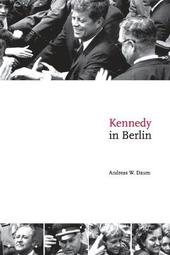
|
Kennedy in Berlin
Paperback / softback
Main Details
Description
Kennedy in Berlin examines one of the most spectacular political events of the twentieth century. It tells the story of the enthusiastically celebrated visit that US president John F. Kennedy paid to Berlin, the 'frontline city of the Cold War,' in June 1963. The president's tour resonated around the world, not least on account of Kennedy's famous declaration - 'Ich bin ein Berliner.' Andreas W. Daum sets Kennedy's visit against the background of the special relationship that had developed between the United States and West Berlin in the wake of World War II, and Kennedy in Berlin is an innovative contribution to the study of transatlantic relations, the Cold War, and the conduct of diplomacy in the age of mass media. Using a broad range of sources, this book sheds new light on the interplay between politics and culture in the modern era.
Author Biography
Andreas W. Daum is a Professor of Modern History at the State University of New York at Buffalo. He has taught at the University of Munich, where he earned his doctorate, and has been a Research Fellow at the German Historical Institute, Washington, DC, and a John F. Kennedy Memorial Fellow at Harvard University. He is the author of Wissenschaftspopularisierung im 19. Jahrhundert and the coeditor of America, the Vietnam War, and the World, with Lloyd C. Gardner and Wilfried Mausbach, and, with Christof Mauch, of Berlin - Washington: Capital Cities, Cultural Representations, and National Identities, both published by Cambridge University Press.
Reviews"Andreas W. Daum's study not only fills a gap in the historiography of German-American relations, but also constitutes a methodological innovation, for it is far more than just a history of John F. Kennedy's legendary visit to Berlin. Although American scholars developed the notion of a cultural interpretation of politics, until now a cultural history of state visits was lacking and Daum convincingly shows how it is done... his research is both convincing and a pleasure to read. The book's narrative style is fresh and unpretentious and Daum succeeds in giving his story the analytical depth that is needed. This is going to be the classic study of Kennedy's visit to Berlin." - Norbert Finzsch, Professor of History and Director of the Institute for Anglo-American History, University of Cologne "Kennedy in Berlin places one of the twentieth century's most dramatic state visits into a wonderfully woven context of taut military confrontation, sensitive alliance politics, bitter personal rivalries, transatlantic mass culture, and emotionally charged political theater, all converging in the Cold War's most crucial arena. Skillfully researched and absorbingly composed, it is a model for how international history should now be written." -Norman J.W. Goda, author of Tales from Spandau: Nazi Criminals and the Cold War "Kennedy in Berlin is a remarkable book about a remarkable moment in 20th century history. John Kennedy's trip to Berlin was defining moment in the history of the Cold War, but as Daum writes, it was also an extraordinary moment in transatlantic relations, symbolic politics at its best. Daum's approach to this event is innovative and highly original, and provides a clear insight into how a transnational community of interests was forged between the United States and Germany. With the recent fraying of those ties, this book becomes even more timely and important." -Thomas A. Schwartz, Vanderbilt University
|